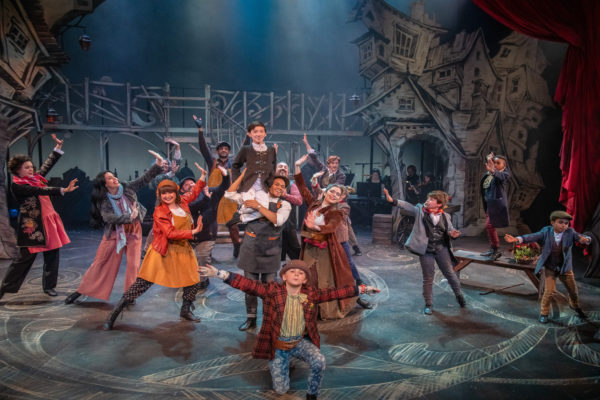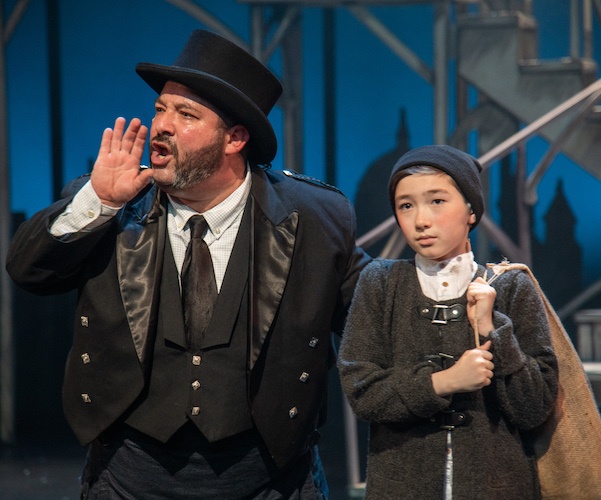Theater Review: New Rep’s “Oliver!” — Less Boundless Energy, Please
By David Greenham
The spirit of Oliver! explodes on stage here, and that is a credit to the ambitions of this company.
Oliver! Book, music, and lyrics by Lionel Bart. Directed and choreographed by Michael J. Bobbitt. Music direction by Sariva Gietz. Scenic design by Luciana Stecconi. Costume design by Rachel Padula-Shufelt. Lighting design by Frank Meissner. Sound design by Kevin Alexander. Produced by New Rep Theatre at the Mosesian Center for the Arts, 321 Arsenal Street, Watertown, MA, through December 29.

The cast of New Rep’s “Oliver!” Photo: Andrew Brilliant/Brilliant Pictures
New Rep’s “Transition” season continues with an energetic, if spotty, production of Lionel Bart’s dark and memorable Oliver! The transition at the center of New Rep’s season is the arrival of new artistic director Michael J. Bobbitt, who, making his New Rep debut as director and choreographer, has infused plenty of vigor into his diverse cast. The spirit of Oliver! explodes on stage here, and that is a credit to the ambitions of this company.
Oliver! is the musical version of Dickens’s second novel, Oliver Twist. Written in 1837, it was a political attack on the so-called New Poor Laws of 1834. They were the laws that created the workhouses where the children long for “Food, Glorious Food” in the opening number of Oliver! They’re also famously referred to by Ebenezer Scrooge, the other Dickens yarn that’s currently playing at theaters throughout the world.
But Oliver Twist has another important connection to Dickens. He spent some time as a boy in similar circumstances, as a bootblack in a shoe factory when he was 12. The terrible experience colored all of his writing, providing the primal trauma that lurks throughout his novels.
If you’re looking for proof that things are eventually going to get better in America, this New Rep production provides welcome clues: the kids make this production worth watching. The youth ensemble of Rollanz “Rollie” Edwards Jr., Ian Freedson Falck, Jane Jakubowski, Michael Rodriguez Jr., and Sydney Johnston (Artful Dodger) are a blast to watch. In the title role, Ben Choi-Harris is as lovely as you could hope for. The gentle “Where Is Love” is the highlight of the evening. His crystal clear voice, excellent diction, and the simplicity of his delivery and movements are examples of the kind of delicate touch that the staging should have embraced more often.
Instead, much of the production comes off as a barrage of energy, movement, and up-tempo action. In some scenes all the vigor worked, such as the rousing “Consider Yourself” and “Who Will Buy,” but all too often freneticism overwhelmed storytelling. The cast members are talented and experienced, but they are made to work too hard to too little effect. It doesn’t take long for boundless energy and shouting to make the intimate Mosesian Center theater feel small and constraining.
There are glimpses, though, of success in this overly zealous production: The staging of “Boy for Sale” with Andy Papas’s vibrant bass as Mr. Bumble, supported by a magical snowfall — created by dancer Jackson Jirard — is nearly perfect. In fact, Jirard is the one performer on stage who incorporates telling detail into nearly every move. His ballet background is evident throughout, and he shines in a series of supporting roles. Likewise, Rashed Alnuami’s Bill Sikes is infused with a well-managed clarity and power. In the second act his character deepens, and the performer provides all the wickedness that’s called for. The second act also brings us a focused and grounded Mr. Brownlow by Luis Megrón, who provides Oliver with a future, albeit by simply bringing him up to the wealthy class. Veteran actor and director Austin Pendleton struggled for much of the production with lines and lyrics, but his “Reviewing the Situation” was another moment that provided a glimpse of what might have been.

Andy Papas and Ben Choi-Harris in New Rep’s “Oliver! ” Photo: Andrew Brilliant/Brilliant Pictures.
Luciana Stecconi’s brilliant set and Frank Meissner’s lights successfully provide the perfect pallette for the show, but Rachel Padula-Shufelt’s steampunk-inspired costumes seem intrusive — in some cases they are just plain confusing. But the staging’s Achilles heel is the sound, which, I assume, springs from a combination of sound designer Kevin L. Alexander and the wonderful live pit orchestra led by Sariva Goetz. The musicians were too loud throughout. In addition, all the actors wore microphones, but the mix was extremely problematic, to the point that words were consistently garbled and lost. Ben Choi-Harris is the only performer whose diction is clear throughout; most of the other cast members work hard to enunciate their way through a variety of English accents. And riddle me this: why, if everyone is wearing a microphone, was there so much shouting?
The bulk of the missed opportunities rest on the shoulders of director and choreographer Bobbitt. His curtain speech suggests that he’s bringing considerable vitality to New Rep, and he’s to be commended for putting a truly diverse company together for this production. However, there’s more work to do when it comes to ensuring that a story is told clearly. In addition, presenting material that has depth and meaning is admirable. But overlooking what makes it particularly relevant today is disappointing.
Bart’s adaptation of the story of Oliver Twist garnered many Olivier and Tony awards, and Carol Reed’s popular film version won six Academy Awards, including Best Picture. While the musical features a number of well-known songs, and more than a few opportunities for old fashioned music-hall production numbers, both the stage and film versions of the stories also retain the underpinnings of the social issues that inspired Dickens to write the story in the first place: English workhouses and the country’s treatment of poor people, especially children, were horrific; there was a very well-defined class structure in Victorian England that sadistically segregated the haves from the have-nots. Women, especially single or “fallen” women, were constantly at risk. Oliver! itself added yet another hot-button ingredient through its use of Eastern European musical themes, which are woven throughout Fagin’s songs. There is a strong suggestion of the stereotype of the thieving Jew. Bart, who was Jewish, fought against this implication for the rest of his life.
Thus a 2019 production of Oliver! is presented with bountiful opportunities to comment on the treatment of young migrants and asylum-seekers at our southern border; on the ever-growing centralization of wealth in our country; on the #metoo movement, and on the rise of instances of anti-Semitism here and in Europe. New Rep’s mission states that the company will produce “plays that speak powerfully to the vital ideas of our time.” Unfortunately, at nearly every turn Bobbitt and his performers chose to look away and ignore the invitation to explore the show’s less comforting issues. Let’s hope that as New Rep continues its Transition season with Hair, Lady Day at Emerson’s Bar and Grill, and August Wilson’s Fences, the company decides to hew closer to its mission.
David Greenham is an adjunct professor of Drama at the University of Maine at Augusta, and is the Associate Director for the Holocaust and Human Rights Center of Maine. He is the current chair of the Maine Arts Commission, and has been a theater artist and arts administrator in Maine for more than 25 years.
Tagged: David Greenham, Michael J. Bobbitt, New Repertory Theatre, musical
